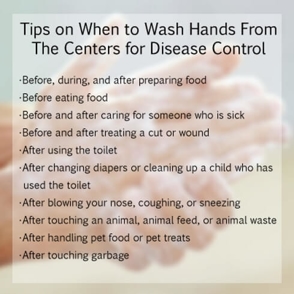 We teach young children how to wash their hands at an early age with the lesson being not to spread germs. Yet somewhere along the way, adults get busy and sometimes skip this important—but very simple—step in preventing the spread of diseases.
We teach young children how to wash their hands at an early age with the lesson being not to spread germs. Yet somewhere along the way, adults get busy and sometimes skip this important—but very simple—step in preventing the spread of diseases.
The World Health Organization celebrates World Hand Hygiene Day on May 5 to encourage the practice of good hand hygiene to reduce the risk of spreading infections. All healthcare providers—including in home caregivers—should wash their hands properly.
No Singing Required, But You Can Hum
School children might learn to sing their ABCs or the “Happy Birthday” song when washing their hands so that they slow down and take time to thoroughly lather and rinse. However, this isn’t necessary for everyone.
The Centers for Disease Control offers tips on hand washing :When to Wash Hands
- Before, during, and after preparing food
- Before eating food
- Before and after caring for someone who is sick
- Before and after treating a cut or wound
- After using the toilet
- After changing diapers or cleaning up a child who has used the toilet
- After blowing your nose, coughing, or sneezing
- After touching an animal, animal feed, or animal waste
- After handling pet food or pet treats
- After touching garbage
And how:
- Wet your hands with clean, running water (warm or cold), turn off the tap, and apply soap.
- Lather your hands by rubbing them together with the soap. Be sure to lather the backs of your hands, between your fingers, and under your nails.
- Scrub your hands for at least 20 seconds. Need a timer? Hum the "Happy Birthday" song from beginning to end twice.
- Rinse your hands well under clean, running water.
- Dry your hands using a clean towel or air dry them.
There is also a video on the CDC website that shows and explains the fundamentals of good hand washing.
Do I Have To?
The bottom line is that hand washing is perhaps the easiest way to prevent the spread of infections and illness. When each individual washes their hands properly, it can help to prevent the spread of disease in an entire community.
The CDC also provides information for patients in health care settings to ask their providers and caregivers to wash their hands when the patient observes a need for this basic hygienic task.
The WHO goal behind World Hand Washing Day is to stop the spread of drug-resistant germs. According to the WHO, Health care-associated infections affect hundreds of millions of patients worldwide every year. Infections lead to more serious illness, prolong hospital stays, induce long-term disabilities, add high costs to patients and their families, contribute to a massive, additional financial burden on the health-care system and, critically, often result in tragic loss of life. By their very nature, infections are caused by many different factors related to systems and processes of care provision as well as to human behaviour, that is conditioned by education, political and economic constraints on systems and countries, and often on societal norms and beliefs. Most infections, however, are preventable.”





